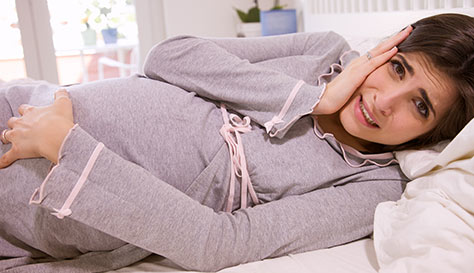What you need to know about diarrhoea in pregnancy
The lowdown on diarrhoea in pregnancy
At a glance
- Many women experience diarrhoea in pregnancy
- It's unlikely to harm your baby but you should let your doctor know if you suspect food poisoning or stomach bug

What causes diarrhoea in pregnancy?
Diarrhoea in pregnancy can be due to a variety of reasons and these include reasons that may not necessarily be harmful. For example, sudden changes in your diet such as eating more healthily than before can cause diarrhoea in pregnancy.
Other reasons may include drinking more water than you’re normally used to consuming, increasing the amount of exercise you’re doing or even taking prenatal vitamins. As your body adjusts to the changes, it results in loose or watery stools and frequent bowel movements. Other symptoms that may follow can include nausea or vomiting.
It's important to be extra vigilant on hygiene if you are suffering with diarrhoea. Make sure you wash your hands before and after using the toilet and have your own towel, don't share a towel with others, and change it regularly.
It’s important to note that diarrhoea in pregnancy can also be due to food poisoning, intestinal infections or a stomach bug. If you suspect this might be the case, consult your doctor as soon as possible.
Is it normal to have diarrhoea when pregnant?
Many women experience diarrhoea at some stage in their pregnancy and some may even experience this just before labour. Mild diarrhoea in pregnancy is often short-lived and is unlikely to harm your baby.
If you find that you have severe diarrhoea and are passing more than three stools a day, visit your doctor to gain expert advice.
What can I take if I have diarrhoea in pregnancy?
Before talking any over-the-counter medicines during your pregnancy, you should check with your midwife, doctor or pharmacist. This includes common anti-diarrhoea medicines such as Imodium or other medications that contain sodium or sodium bicarbonate.
What should I eat if I have diarrhoea in pregnancy?
If you suffer from diarrhoea in pregnancy, you may lose a lot of fluid, salts, sugars and minerals. To replace these, drink plenty of water to stay hydrated. You may also have a loss of appetite but it’s essential to eat for you and your baby so try having small, light and frequent meals.
Many women follow the BRAT diet which can help relieve symptoms of diarrhoea. This includes eating bananas, rice, apple sauce and toast as these are gentle on the digestive tract.
Try to keep away from foods that may aggravate the problem such as dried fruits, spicy foods, milk and high sugar drinks such as pure fruit juice and soft drinks.
When should I seek help for pregnancy diarrhoea?
If you notice anything unusual about your diarrhoea such as the passing of blood, green mucus or black stools, you should contact your doctor or midwife immediately. If you haven’t noticed anything unusual but do suspect that your diarrhoea is not due to positive lifestyle changes or hormones and is a result of something more serious, again, talk to your doctor.
Women who are ill for more than 48 hours, who become severely dehydrated and/or develop a high temperature should seek help from a healthcare professional as soon as possible.